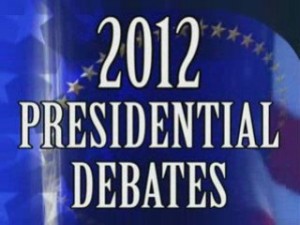Nader calls for \Grand Series\ of nationwide presidential debates

Ralph Nader has put out a call for a "grand series" of twenty-one nationwide presidential debates in 2012, arguing that control over topics and format should be wrested from the bipartisan Commission on Presidential Debates and placed in the hands of local communities all over the country.
"True debates, rather than parallel interviews of the CPD model, would offer depth, variety, and unpredictability to counter the scripted nature of the candidates' political consultants," writes the long-time consumer advocate and former Independent candidate for president in an article published on his Nader.org website this month.
Nader envisions presidential debates as a means of enlivening the civic impulse of voters and invigorating the democratic process.
"Instead of the present, stifling, programmed three debates by the CPD," he states, "these twenty one debates would throw aside many of the taboos, bring the people into the process, address regional needs, excite larger voter turnout and compel the candidates to be better, more forthright candidates."
He also argues that presidential debates should be opened up to candidates outside the two-party system.
"Fresh agendas and personas will be allowed in these debates including third-party candidates who meet reasonable criteria of ballot presence and public support."
So what's the problem with the Commission on Presidential Debates? It may well be that many Americans don't know a great deal about the organization that controls the presidential debate process. The very term "Commission on Presidential Debates" has an official air about it. It might evoke the idea that it is an agency of the state or a governmental authority. It might also be associated with the so-called "blue ribbon" type commission, such as a special task force convened by executive order or legislative directive.
Yet, the Commission on Presidential Debates is nothing of the sort. It is a 501(c)(3) corporation founded in 1987 which is entirely controlled by the Republican and Democratic Parties. Its first two co-chairs were former Democratic Party National Chairman Paul G. Kirk Jr. and former Republican Party National Chairman Frank J. Fahrenkopf Jr. Kirk has since been replaced by Michael D. McCurry, a Democratic National Committee insider and former press secretary for President Bill Clinton.
Until 1988, the League of Women Voters had been organizing presidential debates since at least 1976. The well-respected group withdrew its sponsorship of any and all presidential debates when the process was hijacked by the party committees.
"The League of Women Voters is withdrawing its sponsorship of the presidential debate scheduled for mid-October because the demands of the two campaign organizations would perpetrate a fraud on the American voter," League President Nancy M. Neuman said in a press release from October 3, 1988.
"Neuman called "outrageous" the campaigns' demands that they control the selection of questioners, the composition of the audience, hall access for the press and other issues," the release continued.
At the time, The New York Times reported that, at its founding, the co-chairs of the commission more or less intended it to exclude third party and independent alternatives to the Democratic and Republican parties, which is not surprising given that those -chairs were the sitting chairs of the Democratic and Republican National Committees.
"Mr. Fahrenkopf indicated that the new Commission on Presidential Debates, a nonprofit group made up of representatives from each party, was not likely to look with favor on including third-party candidates in the debates," reported The Times in an article from February 18, 1987.
It continued: "Mr. Kirk was less equivocal, saying he personally believed the panel should exclude third-party candidates from the debates."
At present, the Commission requires that, to be included in any of the debates, a third party or Independent candidate must poll at least 15% support across a series of national polls. It is noteworthy that even this seemingly low bar is almost double the approval rating of the entire Congress, according to some polls. Moreover, it is highly problematic that polling organizations rarely if ever include third party or Independent candidates by name in any of their surveys. How can a candidate demonstrate any level of support in the polls if he or she is not even included in surveys?
Nader suggests taking up a proposal of the Appleseed Citizens' Task Force on Fair Debates, which would invite all candidates who have obtained ballot access in enough states to achieve a majority in the electoral college, if they also demonstrate at least 5% support in national polls.
Given the current
contempt in which the American people hold the Democratic and Republican parties, it is arguably long past time to take control of the presidential debate process from the Republican and Democratic National Committees, and open the system to "fresh agendas and personas," as Mr. Nader writes.





